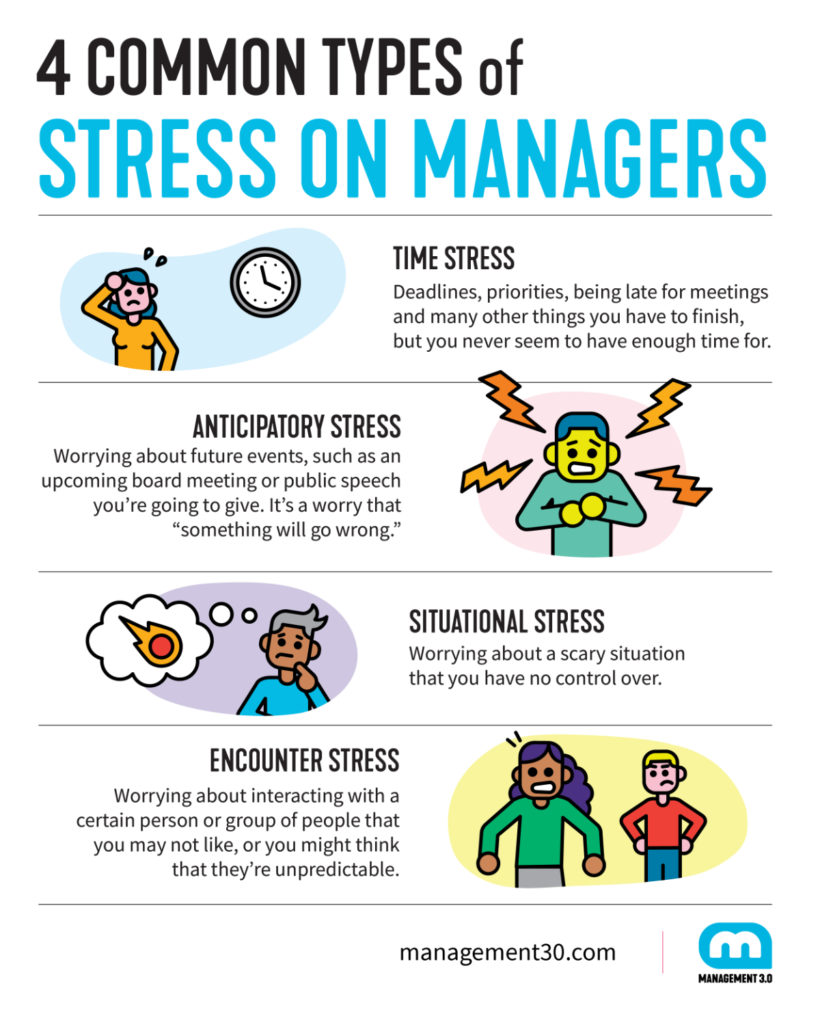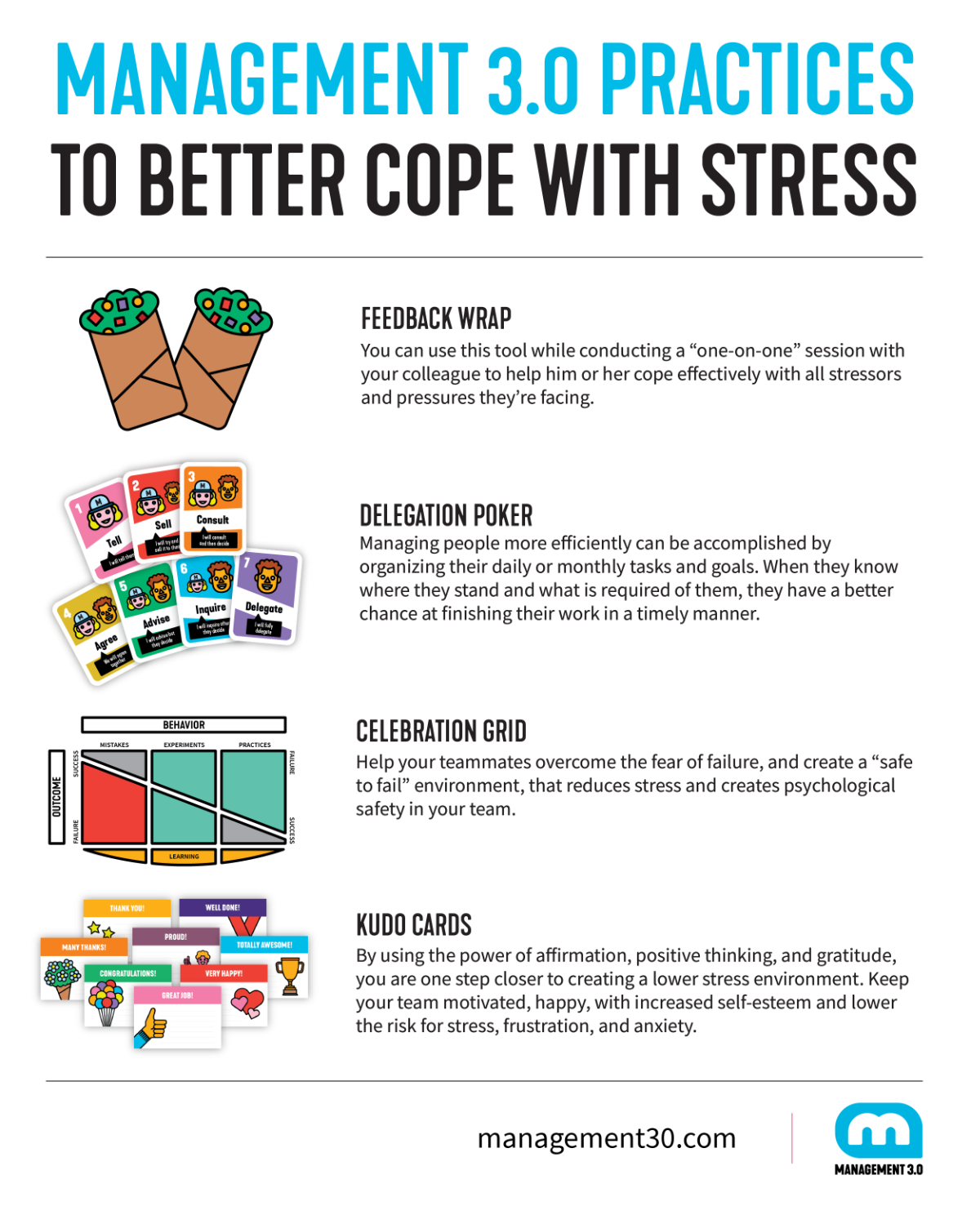An article by Ilija Popjanev, Agile Coach and Management 3.0 Facilitator, to show you how to better manage stress at work and teach you some fab stress management techniques from the Management 3.0 toolbox.
In this article you’ll learn:
- Why it is important to reduce stress at work?
- Managing stress in the workplace: Definition of stress
- How to deal with stress as a manager
- Four common types of stress
- How to help your team reduce and deal with stress
- Exercises for stress management to try with your team (incl. Management 3.0 Practices)
- Your take away for how to deal with stress at work
Why it is Important to Reduce Stress at Work?
Working with people is generally considered stressful and working as a team, can be even more so. Stress is a hidden enemy that is often the cause of negative emotions like anger, deprivation, frustration, and – in addition to leading to many psychosomatic complaints – can generally adversely impact operating results.
Common causes of stress are competitive circumstances where it’s hard to control events where feelings of helplessness can arise.
Practically, everyone deals with stress, but managers tend to deal with an exceptional amount. Whether you’re managing a team of developers or sales people, the process of management demands a strong focus, flawless execution, working under tight deadlines, delegating accountability and frequently coping with things beyond your control.
The dangers of excessive stress range from mental health symptoms such as increased anxiety and depression to physical ones such as high blood pressure and heart disease.
According to, “The Thrive Global Community”, these are the top 10 most stressful events people face during a lifetime, and we are facing many new events during the pandemic.
It’s impossible to eliminate stress entirely, but with the proper techniques and attention, you can learn how to manage stress and prevent it from taking over your life.
However, although we are unable to control all the circumstances that affect the creation of stressful situations, we can learn to change our response to them.
Often, the knowledge and understanding of the causes of stress can assist us in overcoming it so can understanding our position in relation to other people, as a basis for preventing and overcoming conflicts.
In this article, I will share several tips and tools, for how Management 3.0 can help leaders effectively navigate stress, but also protect their team from stress and burnout.
Managing Stress in the Workplace: Definition of Stress
The expression “stress” was first used by the Canadian physician, Hans Seyle in the 1930s, based on his research into the impact of tension on materials (glass and metal).
Seyle in his book: “The stress of life“, defines stress as: “The sum of all unspecified effects of stressors that can impact the body and trigger alarm reactions.”
The definition was based on the classic “fight or flight” physical response in our bodies to danger.
This response is triggered in the oldest part of the brain, the so-called reptilian brain. In more general terms, Seyle also described stress as “the wear and tear on the body in our normal lives.“

His view in 1956 was that “stress is not necessarily something bad – it all depends on how you take it. The stress of exhilarating, creative successful work is beneficial, while that of failure, humiliation or infection is detrimental.”
Selye believed that the biochemical effects of stress would be experienced irrespective of whether the situation was positive or negative.
Robert M. Sapolsky, a professor of biology at Rockefeller University and a widely revered science writer, gives modern and a scientifically validated approach to stress management, described in unique style in his bestselling book “Why Zebras Don’t Get Ulcers.”
He notes that humans and animals share the same “fight or flight “mechanism, meaning that in the presence of great physical danger, our bodies react in much the similar manner: they release vast amounts of energy and direct it to the most important centers at the moment to prepare us to either fight back or flee. This is basically what stress is.
However, humans react in much the same way even in the absence of danger, namely, even if merely thinking about it. And that’s very bad.
Sapolsky boldly quotes:
“God grant me the serenity to accept the things I cannot change, courage to change the things I can, and wisdom to know the difference. — have the wisdom to pick your battles. And once you have, the flexibility and resiliency of strategies to use in those battles are summarized in something I once heard: in the face of strong winds, let me be a blade of grass; in the face of strong walls, let me be a gale of wind. In our privileged lives, we are uniquely smart enough to have invented stressors and uniquely foolish enough to have let them, too often, dominate our lives. Surely we have the potential to be uniquely wise enough to banish their stressful hold.“
I strongly recommend to any leader Sapolsky’s, “Why Zebras Don’t Get Ulcers”, as very contemporary book where you can find almost everything you need to know about stress.
How to Deal with Stress as a Manager
In their daily life, during calls and meetings, but especially now during the pandemic and work from home, managers must gain deeper insights and periodically assess the importance of corporate culture and values, and enhance meaning and purpose, to strengthen team cohesion and improve relationships with all members of the team.
The father of the modern management Peter Drucker quoted: “You cannot manage other people unless you manage yourself first.” Wisely said, so managers must start there first.
According to Dr. Karl Albrecht, a stress management expert, in his book “Stress and the manager“, he explains the four common types of stress managers usually face, depending on the root cause.
4 Common Types of Stress on Managers
1. Time stress, is when you worry about the time. Deadlines, priorities, being late for meetings and many other things you have to finish, but you never have enough time for.
“Your time is limited so don’t waste it living someone else’s life. Don’t be trapped by dogma—which is living with the results of other people’s thinking. Don’t let the noise of others’ opinions drown out your own inner voice. And most important, have the courage to follow your heart and intuition. They somehow already know what you truly want to become. Everything else is secondary.” – Steve Jobs, founder of Apple
Time management is crucial for managers, and using productivity tools such as Trello (Kanban board app) or the Eisenhower matrix (urgent – important), can help reduce time stress.
Productivity guru, David Allen quotes: “Much of the stress that people fill doesn’t come from having too much to do. I comes from not finishing what they’ve started.“
In his book: “Getting Things Done: The Art of Stress-Free Productivity“, he explains GTD, a productivity system that helps complete tasks and meet commitments by using a comprehensive system of principles, lists and calendars. Strongly recommended for busy managers.

2. Anticipatory stress concerns future events, such as an upcoming board meeting or public speech you’re going to give. It’s a worry that “something will go wrong.”
I recommend using the Management 3.0 tool “12 Steps to Happiness“, and focus on the elements that can help you cope with future stress events.
Try to meditate at least for 15 minutes every day, rest well before the upcoming event, and ask for help and assistance from your colleagues.
3. Situational stress happens when you’re in a scary situation that you have no control over.
This could be a situation that involves conflict with somebody, some emergency event or a loss of status in the eyes of your teammates after making a huge mistake.
The key for managing this type of stress is personal awareness and and effective facilitation of conflicts. I recommend the “6 pillars of successful teams“, as a guide that can help you in proactively navigating various situations in your team.
4. Encounter stress revolves around people, when you worry about interacting with a certain person or group of people that you may not like, or you might think that they’re unpredictable.
It can also occur if you have a lot of interactions with people that have high rates of stress, because they don’t feel well or are deeply upset. To manage this type of stress I recommend you start with practicing emotional intelligence, because the ability to recognize people’s emotions, needs and personalities, improves interactions with them and builds better relationships.

In order to manage stress effectively, managers must first use these simple strategies to reduce their personal level of stress and then focus on their teammates and offer help.
How to Help your Team Reduce and Deal with Stress
According to the World Health Organization, workplace stress is particularly common in situations when employees are asked to do things that exceed their knowledge, abilities and coping skills, and when they do not have enough support from peers to close that gap.
The top five things that people say make them feel stressed have to do with workplace conditions that managers could probably do something about, according to the WHO.
Those top five things are: low wages or salaries, lack of opportunity to advance or grow, too heavy a workload, unrealistic job expectations and long hours.
It’s important for managers to spot the signs of stressed-out employees, such as incomplete work, decreased productivity, lower quality of work and mistakes. They can also ease up on deadlines and meet with workers and help them prioritize projects.
All the tools and strategies from the previous section should be applied on the team too, but we at Management 3.0 have more useful practices to offer as well, so stay tuned ☺

Exercises for Stress Management to Try with your Team (incl. Management 3.0 Practices)
1. We in Management 3.0 are very proud of our well known practice: Feedback Wrap.
You can use this tool while conducting a “one-on-one” session with your colleague to help him or her cope effectively with all stressors and pressures they’re facing.
This tool helps improve communication between team members, so they’ll shine in their work when they are confident in their roles, needs and expectations…
2. Managing people more efficiently can be accomplished by organizing their daily or monthly tasks and goals. When they know where they stand and what is required of them, they have a better chance at finishing their work in a timely manner.
To better prioritize tasks and delegate them accordingly among teammates, we use the tools: Delegation Poker and Team Decision Matrix.
Balancing and delegating tasks between teammates can help improve productivity and prevent workload, that eventually produces stress or burnout.
One of the most important stress relievers is having confidence in relying on people to perform efficiently.
Quality performance results when an employee is given adequate time to accomplish their tasks; therefore, reducing the amount of stress in any situation.
3. Try “Cognitive restructuring“, a useful technique developed by psychologist Albert Ellis, to understand unhappy feelings and to challenge wrong beliefs that lie behind them.
You’ll reframe the unnecessary negative thinking that we all experience from time to time.
I suggest using this theory aligned to Management 3.0 practice, Celebration Grid, to help your teammates overcome the fear of failure, and create a “safe to fail” environment, that reduces stress in large portions and creates psychological safety in your team.
4. Use affirmations, a positive thinking that can help in overcoming negative thoughts that many of us have on a regular basis. When we have these thoughts, our confidence, mood and outlook become negative too, so we talk ourselves into believing that we’re not good enough. By doing the opposite, using positive affirmations, we can help our self and our teammates.

Use the Management 3.0 tool, Kudo Cards, to keep your team motivated, happy, with increased self-esteem and low risk for stress, frustration or anxiety. Let your people give Kudo cards to each other, and create a Kudo wall where you can keep them posted.
By using the power of affirmation, positive thinking and gratitude, you are one step further in creating a stress free environment.
Manager’s job is to find out what thoughts their people have about their spiritual, mental and emotional needs? Are they managing time effectively, or does it feel like time is managing them? What are their strengths and development opportunities?
Simply said, they must find the root cause of the stressors that occur with their teammates and know how to use the appropriate tool, to manage or cope with the stressful situation.

Your take away for how to deal with stress at work
Different people handle stress differently, so the role of the manager is to improve his or her: awareness by actively observing themselves and the team to find all stressors, trying to prevent stress by creating stress free environments, reduce the level of stress by using relaxation and healthy life mindsets, and finally, cope with the stress by using all the above mentioned tools and practices from Management 3.0 and beyond.
I will finish this article with the insistence that every leader face and deal with any stressful situation, consider a paradigm shift, remind corporate values, set priorities, better organize time, or in the Management 3.0 language, to better “Manage the system, not the people.”
Header Photo by Karolina Grabowska via Pexels

